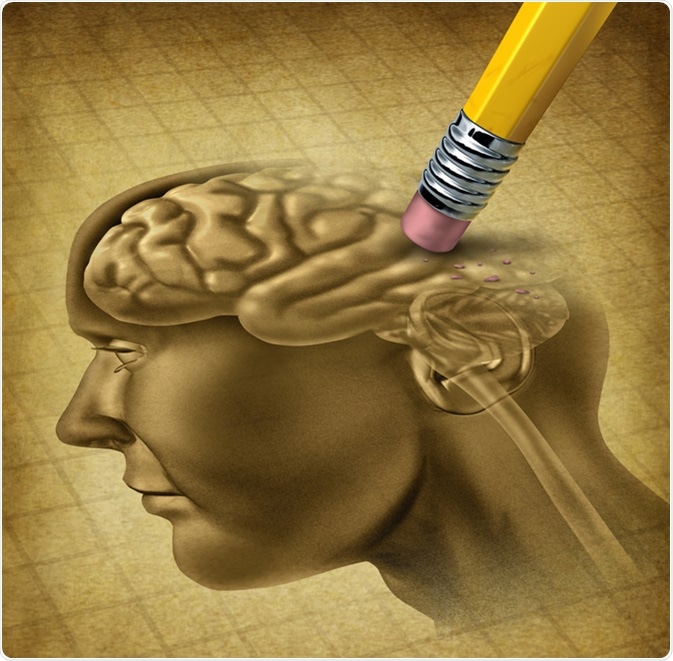Alzheimer’s disease (AD) is a mental health condition associated with dementia (memory loss) and behavioral abnormalities.

Image Credit: Lightspring / Shutterstock
Overview of Alzheimer's Disease
Alzheimer’s begins as mild forgetfulness and confusion, and may eventually lead to complete memory loss, difficulty in making decisions, and even in performing daily routine tasks. These changes are accompanied by changes in personality and other symptoms such as depression, mood swings, social withdrawal, and aggression, among others.
In 2016, 47 million people worldwide are living with Alzheimer's disease. By 2050, the number is expected to skyrocket to 131 million. The disease is the 6th leading cause of death in the United States, with an estimated 5.7 million Americans living with the degenerative disease in 2018.
While age is considered one of the major risk factors for Alzheimer's, the symptoms are not simply the outcome of aging. Several genetic, as well as lifestyle-related factors, contribute to the development of Alzheimer's.
Many theories exist that explain the changes in the brain that cause Alzheimer's disease. But, the commonly agreed one includes the existence of two distinct features – tangles and plaques. Tangles are the abnormal twisting of ‘tau’ protein strands which are responsible for transportation of nerve signals. Plaques pertain to the beta-amyloid protein aggregates which cause interference in cell-to-cell communication and eventually cell death in the brain.
What is Alzheimer's disease? - Ivan Seah Yu Jun
Types of Dementia
There is a difference in the opinions amongst the scientists with regard to the categorization of Alzheimer's disease. Some of them consider it to be a factor that causes dementia, while others define the condition as a type of dementia. The latter opinion puts Alzheimer's alongside other types of dementia, including:
- Mild cognitive impairment (MCI)
- Creutzfeldt-Jakob disease (CJD)
- Dementia with Lewy bodies (DLB)
- Vascular dementia
- Alcohol-related brain damage (ARBD)
- Young-onset dementia
- Frontotemporal dementia (FTD)
- HIV-related cognitive impairment
Alzheimer’s, with the currently available knowledge, is classified into different subtypes according to severity, inflammatory response, and type of onset or trigger.
Types of Alzheimer's Disease
Classification Based on the Severity
Based on the intensity of the typical Alzheimer's symptoms, it can be classified into the following subtypes:
Mild Alzheimer's
This includes the beginning of cognitive impairment that causes difficulties in remembering daily routine such as tasks at work, paying bills , and others. Because these symptoms are not very serious, the patients at this stage manage to remain functional with a certain amount of difficulty. They take longer to perform the same task which they used to do quicker before, and this becomes a pattern.
Moderate Alzheimer's
Because of a significant amount of neuronal damage, the symptoms of moderate Alzheimer's are more intense. The confusion becomes worse and due to the amount of memory loss, they become increasingly dependent on others. These individuals, even though physically agile, are not able to perform routine tasks as the delusions take over the sensory processing of their thoughts.
Severe Alzheimer's
As the plaques and tangles spread, the brain cells start dying. This results in shrinkage of brain tissue. The patients with this condition are typically bedridden and are hardly able to communicate.
These subtypes are more like stages of the disease, and it often progresses from a milder to a more severe form. The sooner the patient is diagnosed with the condition, the better are the chances of treating and preventing its progression.
Classification Based on the Inflammatory Response
Alzheimer’s is categorized into three subtypes based on inflammatory response:
Inflammatory
In addition to the behavioral and cognitive symptoms, this subtype exhibits high serum albumin to globulin ratio and high level of C-reactive protein in response to inflammation.
Non-Inflammatory
This subtype of Alzheimer's does not exhibit elevated inflammatory biomarkers. However, other metabolic abnormalities are usually associated with this condition.
Cortical
A cortical subtype is caused by a deficiency of zinc throughout various regions of the brain. Even though there is no inflammatory response associated with this subtype, it causes abnormalities in normal brain functioning which lead to Alzheimer's disease.
Classification Based on the Onset or Trigger Type
Early-Onset Alzheimer's
The subtype of Alzheimer's disease affecting people below 65 years of age is referred to as early-onset Alzheimer's. This condition is very rare (5 out of 100 Alzheimer's patients). The changes usually happen when the patients reach their late 40s or early 50s. Distinct features of this condition are considered the outcome of a defect in Chromosome 14.
Late-Onset Alzheimer's
Majority of Alzheimer's cases are late-onset, affecting people older than 65 years of age. The exact genetic trigger is not yet identified. Yet, several risk factors have been named by scientists, and further research is ongoing.
Another subcategory of the condition is familial Alzheimer's disease (FAD). This condition is very rare (1 out of 100 cases). A person can only be diagnosed with FAD when the specific genotypic pattern of illness is characterized by the family members, and exact risk can be predicted.
Alzheimer's disease can take a toll on the patients cognitive, physical, and social abilities. The early detection of the disease is crucial in preventing or slowing down its progression.
Further Reading
Last Updated: Sep 9, 2019